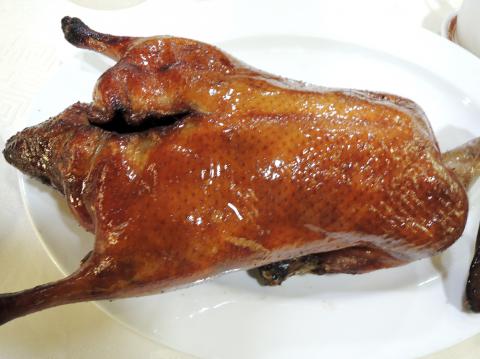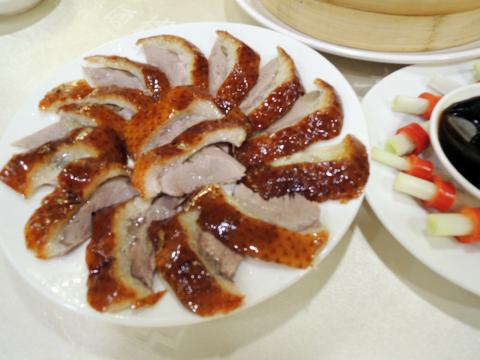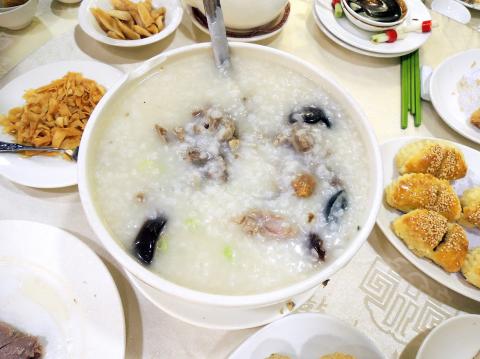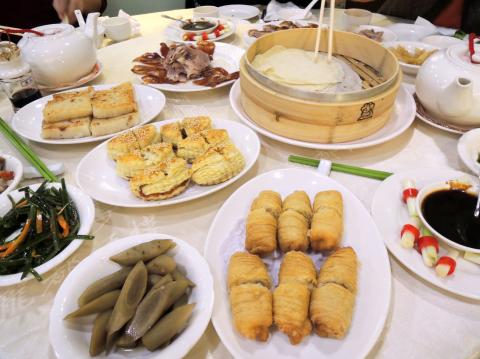Chinese roast duck is a famous dish, and dozens of restaurants in Taipei City offer this specialty. But excellent roast duck is hard to find due to the difficulty of cooking it. Among the kitchens specializing in the dish, Dragon Restaurant (龍都酒樓), or Long Du in Chinese, is a favorite of many serious diners.
Established in 1983, Long Du is a Cantonese restaurant about a 10-minute walk from the Zhongshan MRT Station (中山站). Its roast duck was voted No. 2 in Taiwan in a roast duck survey conducted by Taiwanese search engine Yam (蕃薯藤) last year. The restaurant is always busy, so I made a reservation about half a month ago. Within minutes of our arrival, my family and I were seated at our big round table on the first floor of the three-story restaurant. Although the seating was tight, the high ceiling and chandeliers that hung above added a nice touch to the room.
We ordered four appetizers for NT$50 each: kelp, burdock, century eggs, and dried radishes. In 15 minutes, the waitress served our pre-ordered Cantonese Roast Duck (廣式片皮鴨, NT$1,200) — along with the garnishes: thin pancakes, green onions and sweet bean sauce.

Photo: Eddy Chang, Taipei Times
Eating at Long Du is as much about watching a performance as it is about eating good food. Our waitress first showed us the whole duck, including the head, and asked how we would like it to be cut. Unlike Peking duck, which is cooked with less seasoning and consists mostly of crispy skin and little meat, there are two ways to do it at Long Du: cut the meat with or without the skin. Our duck was large enough for us to enjoy it both ways. She then skillfully sliced the duck into small pieces and arranged them on two plates beautifully next to our table. I felt like I was watching an exciting cooking show.
For the first plate, the crispy skin, duck fat, and juicy meat were a perfect combination. But for the second, the meat was slightly dry since the fat was trimmed. How to eat Chinese roast duck properly? Always remember to fold the bottom of your duck pancake, because the sauce may drip on your lap if you fail to do it right.
Apart from its signature duck, Long Du is famous for its popular Cantonese Duck Congee (薑絲皮蛋鴨骨粥, NT$300), which is a must try. Our congee was cooked with the duck meat and bones left over from the carved bird, century eggs, and shredded ginger. The robust duck flavor penetrated the perfectly boiled creamy rice.

Photo: Eddy Chang, Taipei Times
One cannot go to a Cantonese restaurant without ordering some dim sum. Long Du offers over 30 varieties of dim sum priced between NT$78 and NT$128. We ordered Sesame Balls (流沙芝麻球, NT$78), Radish Cakes (臘味蘿蔔糕, NT$78), Spare Ribs (豉汁蒸排骨, NT$90), Spring Rolls (上海炸春捲, NT$90), Barbecue Pork Pastries (蜜汁叉燒酥, NT$100) and Radish Pastries (蘿蔔絲酥餅, NT$100). I enjoyed the moist filling of the radish pastries and strongly recommend the dish. But some of the dishes are only available at lunch, including radish pastries. If you prefer dim sum, it’s better to go for lunch.
For the big meal for seven adults, I paid NT$3,390 (NT$485 per person), including a 10-percent service charge. The restaurant offers a NT$100 coupon for every NT$1,000 spent, so I received three NT$100 coupons for my next visit. Overall, Long Du was a pleasant dining experience. It is a good choice for all duck lovers and whoever likes to try one of the signature dishes of Chinese cuisine.
And a reminder to those who go: The number of ducks per day is limited. Be sure to make a reservation two to three weeks in advance.

Photo: Eddy Chang, Taipei Times

Photo: Eddy Chang, Taipei Times

Even by the standards of Ukraine’s International Legion, which comprises volunteers from over 55 countries, Han has an unusual backstory. Born in Taichung, he grew up in Costa Rica — then one of Taiwan’s diplomatic allies — where a relative worked for the embassy. After attending an American international high school in San Jose, Costa Rica’s capital, Han — who prefers to use only his given name for OPSEC (operations security) reasons — moved to the US in his teens. He attended Penn State University before returning to Taiwan to work in the semiconductor industry in Kaohsiung, where he

On May 2, Chinese Nationalist Party (KMT) Chairman Eric Chu (朱立倫), at a meeting in support of Taipei city councilors at party headquarters, compared President William Lai (賴清德) to Hitler. Chu claimed that unlike any other democracy worldwide in history, no other leader was rooting out opposing parties like Lai and the Democratic Progressive Party (DPP). That his statements are wildly inaccurate was not the point. It was a rallying cry, not a history lesson. This was intentional to provoke the international diplomatic community into a response, which was promptly provided. Both the German and Israeli offices issued statements on Facebook

May 18 to May 24 Pastor Yang Hsu’s (楊煦) congregation was shocked upon seeing the land he chose to build his orphanage. It was surrounded by mountains on three sides, and the only way to access it was to cross a river by foot. The soil was poor due to runoff, and large rocks strewn across the plot prevented much from growing. In addition, there was no running water or electricity. But it was all Yang could afford. He and his Indigenous Atayal wife Lin Feng-ying (林鳳英) had already been caring for 24 orphans in their home, and they were in

Australia’s ABC last week published a piece on the recall campaign. The article emphasized the divisions in Taiwanese society and blamed the recall for worsening them. It quotes a supporter of the Taiwan People’s Party (TPP) as saying “I’m 43 years old, born and raised here, and I’ve never seen the country this divided in my entire life.” Apparently, as an adult, she slept through the post-election violence in 2000 and 2004 by the Chinese Nationalist Party (KMT), the veiled coup threats by the military when Chen Shui-bian (陳水扁) became president, the 2006 Red Shirt protests against him ginned up by